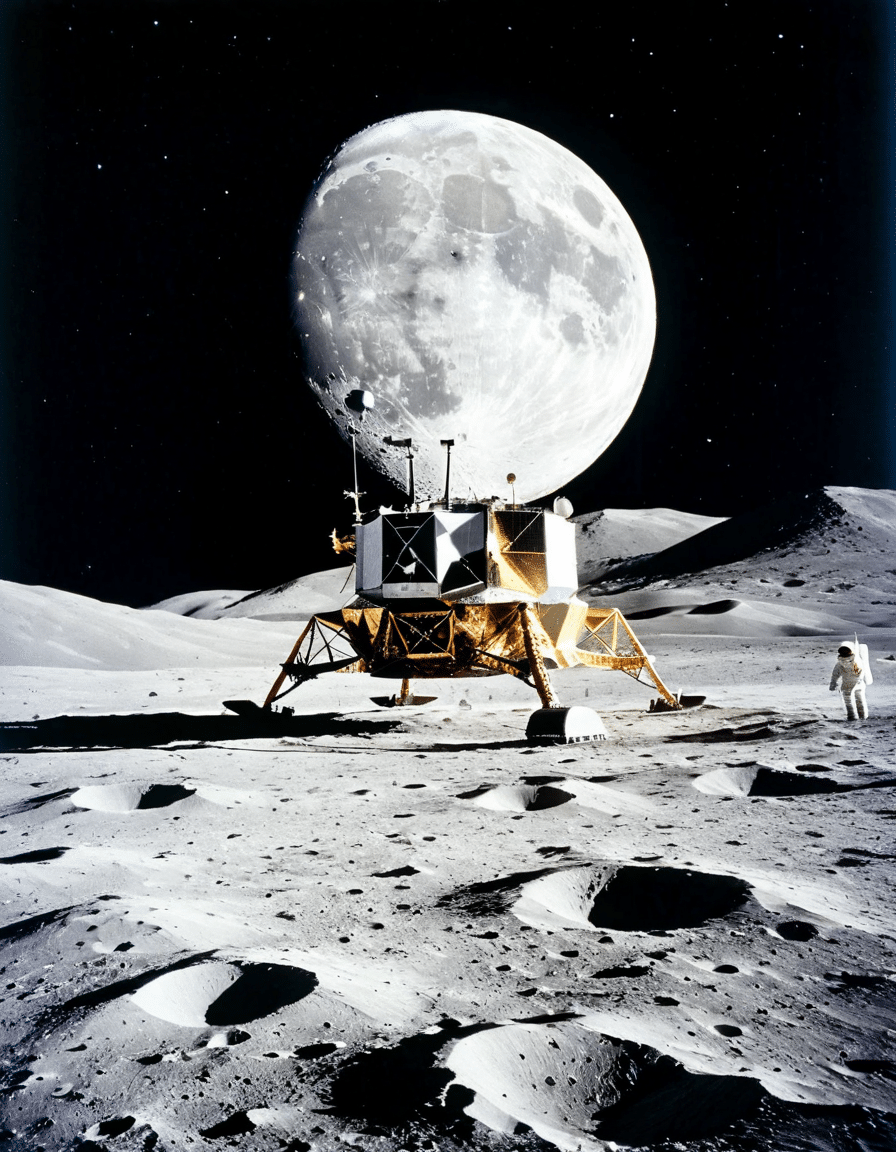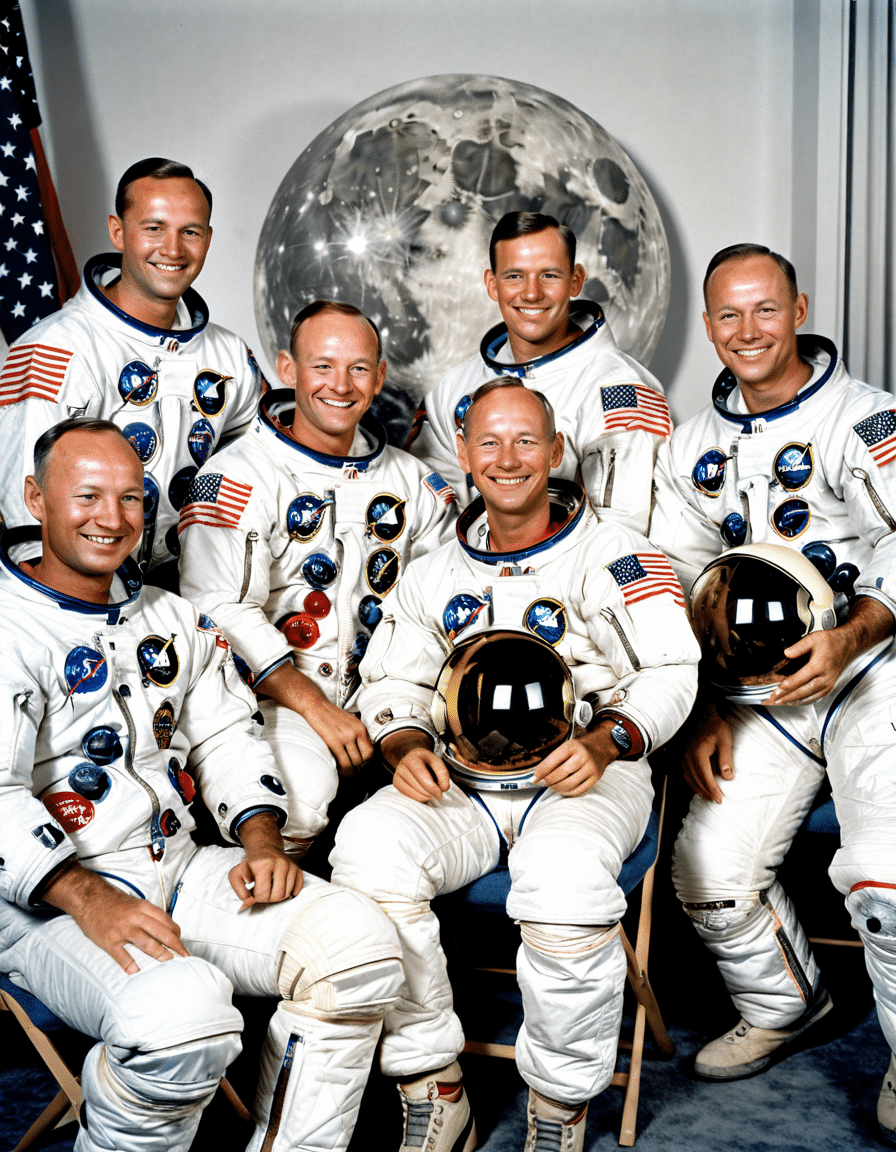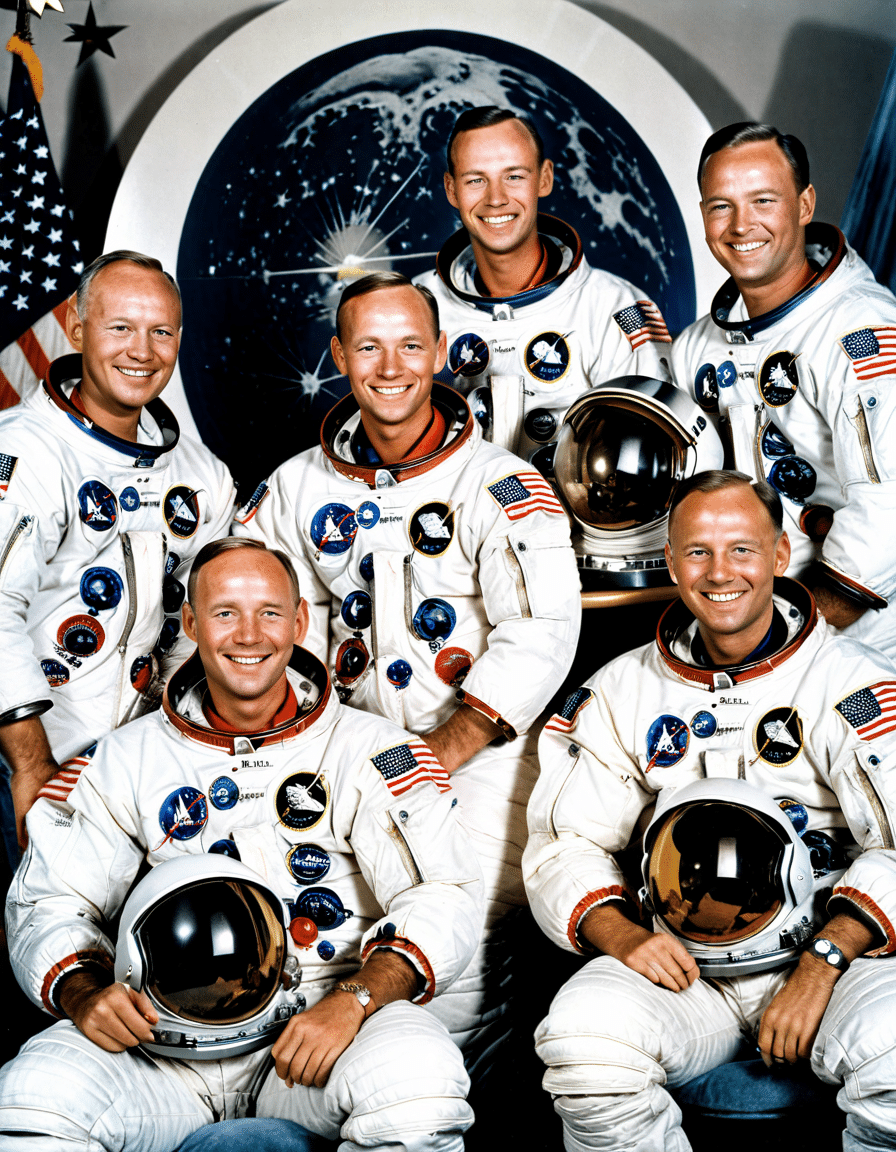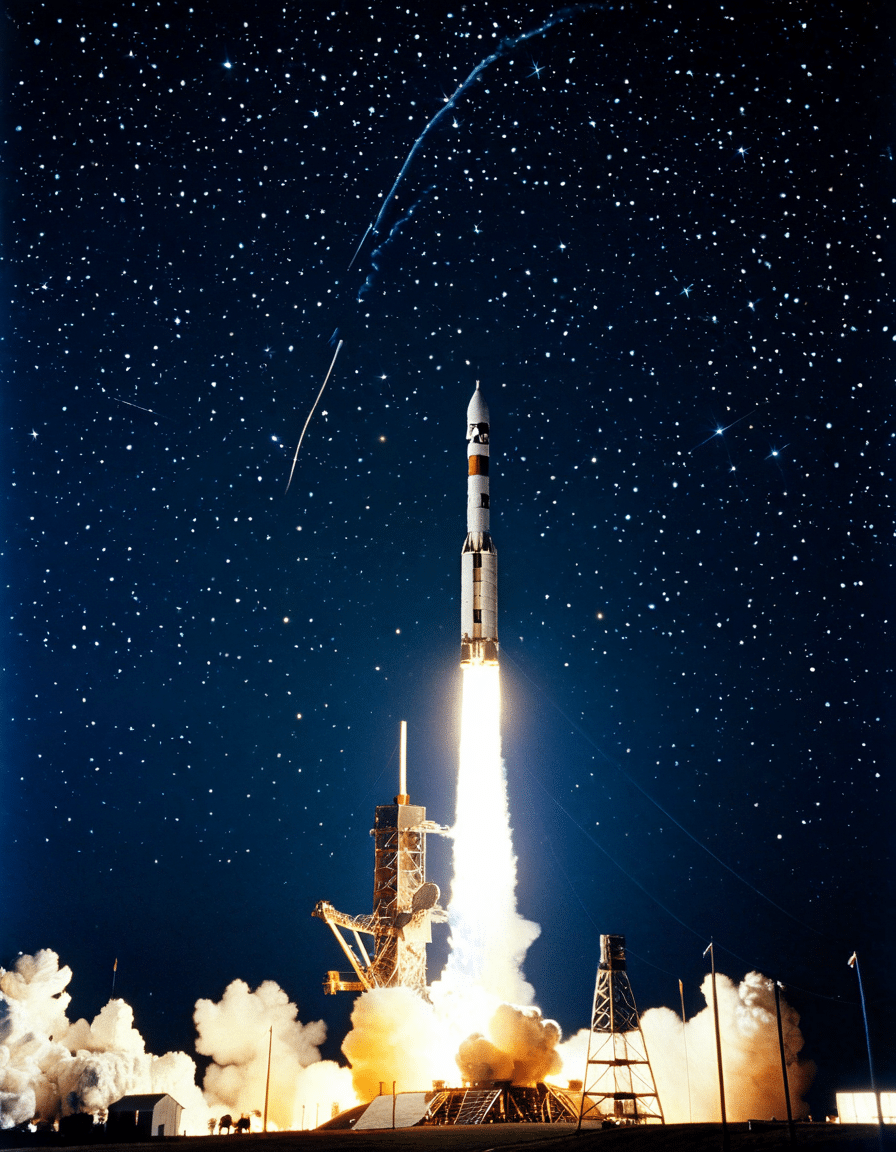The Apollo 11 mission stands as a monumental achievement in human history, marking the first successful manned landing on the lunar surface. Launched on July 16, 1969, this mission not only etched itself into the annals of history but also fulfilled President Kennedy’s dream of landing a man on the Moon by the decade’s end. In fact, it ignited a global fascination with space travel that still illuminates our imaginations today. So, grab your space helmets as we embark on a detailed exploration of the Apollo 11 mission, including its challenges, triumphs, and impact, especially when compared to the infamous Apollo 13.

7 Key Milestones of Apollo 11 that Changed Space Exploration Forever
1. The Launch from Kennedy Space Center
On that fateful July day, the Apollo 11 mission blasted off aboard the Saturn V rocket, the most powerful vehicle ever built. Can you imagine the thrill in the air? The roar of the engines, the cheers from the crowd—people had gathered to witness an event that would shake the very foundations of science and inspire generations. Little did they know, this launch was the start of something monumental, not just for Americans but for the whole globe.
2. The Lunar Module’s Descent
Fast forward to July 20, 1969. The Lunar Module, affectionately named “Eagle,” separated from the Command Module “Columbia.” Neil Armstrong’s piloting prowess was put to the ultimate test when he faced unexpected rocky terrain on the Moon. “Houston, Tranquility Base here. The Eagle has landed,” he famously said. It was a defining moment that underlined human adaptability in extreme situations—traits we all wish we had when faced with a tough math exam or a really challenging recipe, am I right?
3. The First Steps on the Moon
The moment everyone had been waiting for arrived as Neil Armstrong became the first human to step onto the lunar surface. His iconic words—“That’s one small step for man, one giant leap for mankind”—resonated throughout the universe. This wasn’t merely about putting footprints on the Moon; it embodied humanity’s collective hope and potential for future exploration. It turned the Moon into a symbol of what we can achieve when we put our minds to it—sort of like finally figuring out how to fold a fitted sheet!
4. Scientific Discoveries
But Apollo 11 wasn’t just a glorious PR stunt; it also delivered scientific payloads. Astronauts collected lunar rocks and soil samples that revealed the Moon’s geological secrets. For instance, these samples helped us understand how celestial bodies form. The research spurred by Apollo 11 opened avenues for planetary science, proving crucial for future endeavors—like planning missions to Mars, where the soil might hide even more secrets.
5. International Impact and Technology Advancements
It’s pretty wild how Apollo 11 impacted more than just space exploration. The mission catalyzed international partnerships and advancements in technology. The tech fruits of Apollo 11 didn’t just float away into the cosmos; they trickled down to our everyday lives, leading to innovations in telecommunications and computer technology. This leap forward laid the groundwork for the digital age—you could say it was “mission accomplished” in every sense!
6. The Return Journey
Space travel isn’t all about glitz and glam; it involves a lot of planning. After a successful rendezvous in lunar orbit, Apollo 11 made its way back to Earth. It splashed down in the Pacific Ocean on July 24, 1969, safe and sound. The crew’s recovery—splashing down like they just got done with a wild water park ride—demonstrated the importance of collaboration and precision in space missions. It’s just like how your family rallies together when you’re trying to find your favorite show on Netflix!
7. The Legacy of Apollo 11
The Apollo 11 mission didn’t just fly off into the sunset; its legacy continues to shape modern space programs. NASA’s Artemis project aims to return humans to the Moon and eventually reach Mars, all the while paying homage to the foundation laid by Apollo 11. This mission serves as a guiding star, reminding us that when we collaborate, we can achieve remarkable things. So, buckle up, everyone; the best is yet to come!

Apollo 11 and Apollo 13: A Comparative Study of Challenges in Space Travel
While Apollo 11 was a successful lunar landing, Apollo 13 throws a spotlight on the harsh realities of space exploration. Launched on April 11, 1970, Apollo 13 faced a crisis when an oxygen tank exploded, putting the crew’s lives on the line. The juxtaposition of excitement and danger forms a compelling narrative—one that teaches us invaluable lessons about human resilience.
Key Differences Between Apollo 11 and Apollo 13
The Enduring Impact of Apollo 11 and Lessons for Future Space Exploration
The Apollo 11 mission was monumental in history; it cemented principles of international cooperation, scientific discovery, and innovation that are still relevant today. But it goes deeper; lessons from Apollo 11, coupled with the intense experiences of Apollo 13, reveal the necessity of preparation, adaptability, and, most importantly, collaboration in space exploration.
As we gaze into the telescope of the future, the challenges and triumphs of these missions can guide us in our quest—whether it’s planning a permanent lunar base, gearing up for Mars exploration, or embarking on missions to the outer planets. The Apollo missions illustrate the remarkable heights humanity can reach when we face adversities together. And in a world often divided by differences, isn’t that a message we could all use right now?
From Neil Armstrong to the daring astronauts of Apollo 13, these missions remind us not just to dream but to chase those dreams—racing past the stars to benefit all of humankind. Now that’s a cinematic adventure worth watching, wouldn’t you agree?
Apollo 11: Fun Trivia and Interesting Facts
The Facts Behind the First Moon Landing
In July of 1969, when Apollo 11 made its historic journey to the Moon, Neil Armstrong and Buzz Aldrin became the first humans to set foot on lunar soil, while Michael Collins orbited above. This monumental event was watched by an estimated 600 million people. To put that into perspective, that’s roughly the same percentage of viewers as some of the biggest reality TV finales today, like the success of Jessica Aldeans chart-topping hits. Armstrong’s famous words,That’s one small step for man, one giant leap for mankind, echoed around the world, marking a pivotal moment in human history.
Did you know the Apollo 11 mission was almost derailed before it even launched? Technical glitches and delays plagued the team, yet they persevered. With rigorous testing and unwavering dedication, NASA’s engineering marvels shone brighter than ever. The Saturn V rocket, which took Apollo 11 into space, was the most powerful rocket ever built. Its fuel types, namely kerosene and liquid oxygen, remind you of how crucial precise reactions are, much like finding the right hair type for your ideal hairstyle. Not just any rocket could handle the pressures of space travel!
Iconic Moments and Cultural Impact
The Apollo 11 mission didn’t just explore new frontiers; it also left a lasting impact on popular culture. The iconic images and footage from that mission inspired countless films, books, and even TV shows. If you remember My Wife And Kids, you might find references to space exploration in episodes, showcasing how these real-life events bled into everyday storytelling. The bravery of the astronauts can be likened to the fearless cheerleader spirit, busting through barriers and uniting people from all walks of life.
Interestingly, the astronauts didn’t just collect moon rocks during their lunar visit. They also left mementos behind, including the US flag and a patch honoring the fallen Apollo 1 crew. Just as Penelope Cruz lights up the silver screen with her passionate performances, the Apollo 11 mission brought a new light to humanity’s aspirations. And let’s not forget the debates it sparked over the ethics of space exploration versus earthly priorities! This discourse even found its way into media coverage with personalities like Martha Maccallum engaging audiences with their takes on significant space exploration events.
In conclusion, the Apollo 11 journey stands out as a testament to human ingenuity. Just as we often ponder life’s paths, the mission opened a thrilling chapter in our quest for knowledge. Today, we continue to celebrate those brave souls as they remind us that exploration is an incredible part of our history, paving the way for future journeys into unknown horizons—much like how fans explore new genres of lps or delve into complex narratives that captivate them!


























